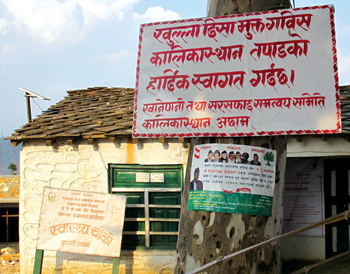
KUNDA DIXIT
A Nepali Congress poster shares a tree trunk with a sign declaring the village of Kalikasthan in Achham open-defecation free (pic, right). Achham and Kalikot have become the latest districts in a government campaign of toilets for all by 2017. The rest of the country is not waiting for Kathmandu to get its politics right, as the capital’s messy transition drags on.
Suddenly, though, politics lurched forward after a three-month deadlock with the announcement of Tuesday, 19 November 2013 as the date for elections. The logjam was cleared once the Big Four political parties accepted their failure to agree on amending electoral laws and allowed the Chief Justice-led government to sort that out and announce an election date.
There are still doubts about whether the parties have really abdicated their role and if the interim election government is only a rubber stamp body. But the announcement on Thursday gives it more legitimacy.
In a day of fast-paced developments, Chairman Khil Raj Regmi met Chief Election Commissioner Nil Kantha Uprety in the morning to iron out details and the council of ministers worked on the wording of the changes in electoral laws in an ordinance to send to President Ram Baran Yadav for formal ratification.
The ordinance has finally bypassed disagreements between the big four main parties over the question of threshold for proportional representation, delineation of constituencies, and whether or not candidates with criminal records should be allowed to contest elections. The cabinet also decided to set up an Electoral Constituency Delineation Commission to map out new voting areas.
However, the breakaway CPN-M faction of the Maoists needs to be brought on board. “Fixing the election date without taking our demands into account could lead to conflict,” warned CP Gajurel of the CPN-M on Thursday, “we will not accept forced elections.”